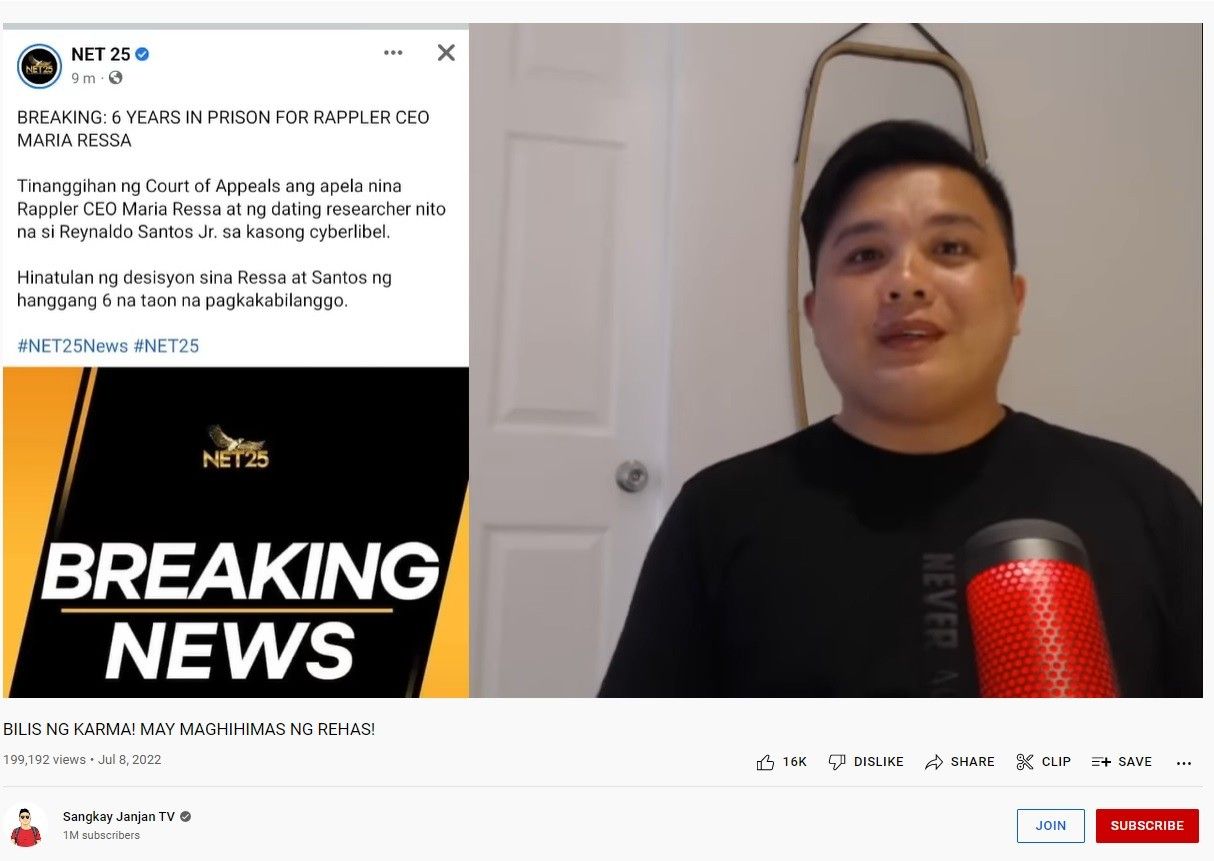Fact check: Rappler's Ressa not behind bars, out on post-conviction bail

MANILA, Philippines — A vlogger claimed Rappler CEO Maria Ressa and their former staff, who are both out on post-conviction bail, will be in prison for six years, after the Court of Appeals rejected their plea to overturn their conviction.
CLAIM: Vlogger Sangkay Janjan TV released a vlog entitled “BIlis ng Karma! May maghihimas ng rehas!” while referring to Ressa and ex-Rappler researcher Reynaldo Santos Jr.
RATING: This is misleading.
FACTS: The case has yet to reach finality and parties are still entitled to appeal all the way to the Supreme Court.
What the post said
With the misleading title, the vlogger went on to read the social media post of Net 25 that read: “BREAKING: 6 years in prison for Rappler CEO Maria Ressa.”
He also claimed that Ressa "went up against" (binangga) a businessman Wilfredo Keng, and the government has nothing to do with the case.
"Ito ang binangga yung isang businessman. Hindi kasama ang gobyerno natin at sa katotohanan ang isa lang mapanagot ng gobyerno natin, foreign ownership dahil nabisto ng [Securities and Exchange Commission] na funded ito ng mga banyaga," he continued, mixing up cases the news site is facing.
"Ang bilis ng karma. Naku po, rehas ‘to," he ended.

Philstar.com screengrab, July 14 10:40 a.m.
What it left out
While the Court of Appeals rejected the appeal of Ressa and Santos to overturn their cyberlibel conviction, the CA also modified their prison sentence.
The Manila court had sentenced them to a prison term ranging from six months and a day to six years, but the CA modified their punishment to a jail time of six months and a day to six years, eight months and 20 days—longer by eight months and 20 days from the trial court judgment.
However, Ressa and Santos posted post-conviction bail and are not imprisoned. They also can still file an appeal and elevate their case—seen as the test case in the young Anti-Cybercrime Act of 2012—all the way to the Supreme Court.
The CA relied on Articles 25 (penalties which may be imposed) and 9 (Grave felonies, less grave felonies and light felonies) in modifying the prison sentence, while the lower court cited Article No. 3326 that applies to offenses punishable by special laws without their own prescriptive periods.
At the CA level — and even at the Manila court level — the plaintiff has long been People of the Philippines, and not Wilfredo Keng, as the Department of Justice already indicted Ressa and Santos.
Government lawyers have been prosecuting Ressa and Santos before the courts, although the case stemmed from a complaint by Wilfredo Keng.
The SEC case Rappler Inc. is facing is on different grounds from the cyber libel case against Ressa and Santos.
Essential context
In rejecting Ressa’s appeal, the CA also held that cyber libel cases may be filed when assailing online articles up to 15 years after publication.
In the Manila court ruling that Ressa and Santos appealed, Judge Rainelda Estacio-Montesa said the offense had not yet prescribed, citing Panaguiton Jr. v. Department of Justice that Act No. 3326 applies to offenses punishable by special laws without their own prescriptive periods. In this case, it was 12 years.
A prescriptive period is the maximum period set by law that legal action, like filing a complaint, can be brought forward. Complaints can no longer be filed after that period.
But the CA citing the RPC instead and said: "Considering the increase of penalty by one degree pursuant to Section 6 of Cybercrime Law, the penalty for cyberlibel becomes afflictive and shall prescribe in 15 years.
Why does it matter?
Six days after posting, the video already has 199,192 views and 1,444 comments.
We fact-checked this to clarify that although Ressa and Santos were arrested in 2020, they are not yet to be imprisoned since they already paid and were allowed post-conviction bail.
The vlogger also accused the news site of doing fake news, an accusation thrown at Philippine media that has been used to discredit mainstream and legitimate news organizations.
--
This story is supported by the Philippine Fact-check Incubator, an Internews initiative to build the fact-checking capacity of news organizations in the Philippines and encourage participation in global fact-checking efforts.
Philstar.com is also a founding partner of Tsek.ph, a collaborative fact-checking project for the 2022 Philippines’ elections and an initiative of academe, civil society groups and media to counter disinformation and provide the public with verified information.
Want to know more about our fact-checking initiative? Check our FAQs here. Have a claim you want fact-checked? Reach out to us at [email protected].
- Latest
- Trending






























